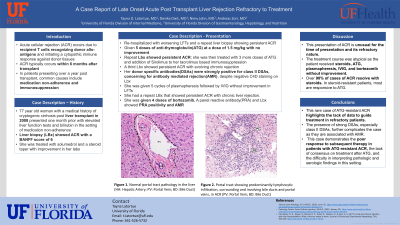Sunday Poster Session
Category: Liver
P1369 - A Case Report of Late Onset Acute Post Transplant Liver Rejection Refractory to Treatment
Sunday, October 27, 2024
3:30 PM - 7:00 PM ET
Location: Exhibit Hall E

Has Audio
- TL
Tayna Latortue, MD
University of Florida
Gainesville, FL
Presenting Author(s)
Tayna Latortue, MD1, Devika Dixit, MD2, Nimy John, MD3, Andreas Zori, MD2
1University of Florida, Gainesville, FL; 2University of Florida College of Medicine, Gainesville, FL; 3University of Florida College of Medicine, Newberry, FL
Introduction: Acute cellular rejection(ACR) occurs due to recipient T cells recognizing donor alloantigens and initiating a cytopathic immune response against donor tissues. ACR typically occurs within 6 months after transplant; in patients presenting over a year post transplant, common causes include medication non-adherence and immunosuppression reduction.
Case Description/Methods: A 77-year old woman with a medical history of cryptogenic cirrhosis post liver transplant in 2008 presented in 04/2023 with elevated liver function tests(LFTs) and bilirubin in the setting of medication nonadherence and a viral illness. A liver biopsy(Lbx) showed ACR with a BANFF score of 6. She was given IV solumedrol and a steroid taper with improvement in LFTs and bilirubin. She was re-hospitalized in 5/2023 with worsening LFTs. Repeat Lbx showed persistent ACR. An ERCP showed stable stricture and her biliary stent was replaced with no improvement in bilirubin. She was given 5 doses of anti-thymoglobulin(ATG) at a dose of 1.5 mg/kg with no improvement. A repeat Lbx showed persistent ACR; she was then treated with 3 more doses of ATG and addition of Sirolimus to her tacrolimus based immunosuppression. A third Lbx showed persistent ACR with evolving chronic rejection. Her donor specific antibodies(DSAs) were strongly positive for class II DSAs, concerning for antibody mediated rejection(AMR), despite negative C4D staining on Lbx. She was given 5 cycles of plasmapheresis followed by IVIG without improvement in LFTs. She had a repeat LBx that showed persistent ACR with chronic liver rejection. She was given 4 doses of bortezomib. A panel reactive antibody(PRA) and Lbx showed PRA positivity and AMR.
Discussion: This presentation of ACR is unusual for the time of presentation and its refractory nature. The treatment course was atypical as the patient received steroids, ATG, plasmapheresis, IVIG, and bortezomib without improvement. Over 90% of cases of ACR resolve with steroids. In steroid-resistant patients, most are responsive to ATG. This rare case of ATG-resistant ACR highlights the lack of data to guide treatment in refractory patients. The presence of strong DSAs, especially class II DSAs, further complicates the case as they are associated with AMR. This case demonstrates the poor response to subsequent therapy in patients with ATG-resistant ACR, the lack of consensus on treatment after ATG, and the difficulty in interpreting pathologic and serologic findings in this setting.
Disclosures:
Tayna Latortue, MD1, Devika Dixit, MD2, Nimy John, MD3, Andreas Zori, MD2. P1369 - A Case Report of Late Onset Acute Post Transplant Liver Rejection Refractory to Treatment, ACG 2024 Annual Scientific Meeting Abstracts. Philadelphia, PA: American College of Gastroenterology.
1University of Florida, Gainesville, FL; 2University of Florida College of Medicine, Gainesville, FL; 3University of Florida College of Medicine, Newberry, FL
Introduction: Acute cellular rejection(ACR) occurs due to recipient T cells recognizing donor alloantigens and initiating a cytopathic immune response against donor tissues. ACR typically occurs within 6 months after transplant; in patients presenting over a year post transplant, common causes include medication non-adherence and immunosuppression reduction.
Case Description/Methods: A 77-year old woman with a medical history of cryptogenic cirrhosis post liver transplant in 2008 presented in 04/2023 with elevated liver function tests(LFTs) and bilirubin in the setting of medication nonadherence and a viral illness. A liver biopsy(Lbx) showed ACR with a BANFF score of 6. She was given IV solumedrol and a steroid taper with improvement in LFTs and bilirubin. She was re-hospitalized in 5/2023 with worsening LFTs. Repeat Lbx showed persistent ACR. An ERCP showed stable stricture and her biliary stent was replaced with no improvement in bilirubin. She was given 5 doses of anti-thymoglobulin(ATG) at a dose of 1.5 mg/kg with no improvement. A repeat Lbx showed persistent ACR; she was then treated with 3 more doses of ATG and addition of Sirolimus to her tacrolimus based immunosuppression. A third Lbx showed persistent ACR with evolving chronic rejection. Her donor specific antibodies(DSAs) were strongly positive for class II DSAs, concerning for antibody mediated rejection(AMR), despite negative C4D staining on Lbx. She was given 5 cycles of plasmapheresis followed by IVIG without improvement in LFTs. She had a repeat LBx that showed persistent ACR with chronic liver rejection. She was given 4 doses of bortezomib. A panel reactive antibody(PRA) and Lbx showed PRA positivity and AMR.
Discussion: This presentation of ACR is unusual for the time of presentation and its refractory nature. The treatment course was atypical as the patient received steroids, ATG, plasmapheresis, IVIG, and bortezomib without improvement. Over 90% of cases of ACR resolve with steroids. In steroid-resistant patients, most are responsive to ATG. This rare case of ATG-resistant ACR highlights the lack of data to guide treatment in refractory patients. The presence of strong DSAs, especially class II DSAs, further complicates the case as they are associated with AMR. This case demonstrates the poor response to subsequent therapy in patients with ATG-resistant ACR, the lack of consensus on treatment after ATG, and the difficulty in interpreting pathologic and serologic findings in this setting.
Disclosures:
Tayna Latortue indicated no relevant financial relationships.
Devika Dixit indicated no relevant financial relationships.
Nimy John indicated no relevant financial relationships.
Andreas Zori indicated no relevant financial relationships.
Tayna Latortue, MD1, Devika Dixit, MD2, Nimy John, MD3, Andreas Zori, MD2. P1369 - A Case Report of Late Onset Acute Post Transplant Liver Rejection Refractory to Treatment, ACG 2024 Annual Scientific Meeting Abstracts. Philadelphia, PA: American College of Gastroenterology.
